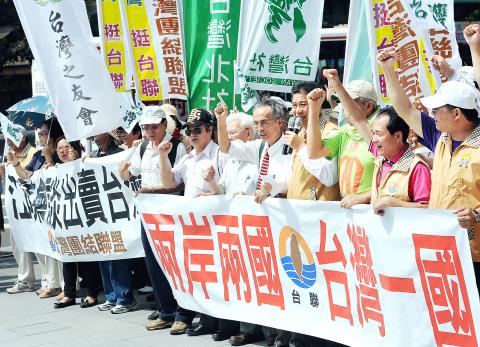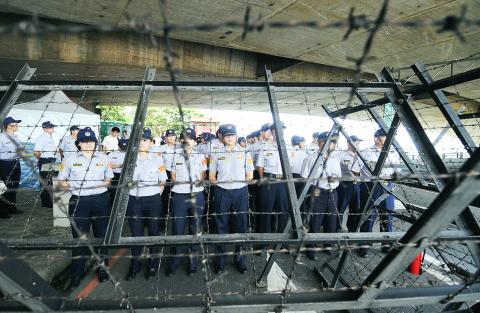Chinese envoy Chen Yunlin (陳雲林) arrived in Taipei yesterday to begin negotiations on a cross-strait investment protection agreement, amid protests by pro-independence activists concerned that the pact could damage Taiwanese sovereignty.
The chairman of the Association for Relations Across the Taiwan Straits (ARATS) is on a three-day visit to hold talks with his Taiwanese counterpart, Straits Exchange Foundation (SEF) Chairman Chiang Pin-kung (江丙坤). The two are expected to sign the investment protection pact today at the Grand Hotel.
Hundreds of police have been deployed around the Grand Hotel and its vicinity, and barricades have been put up in front of all entrances to the hotel to keep out protesters. The control area was expanded to 10km2, with police cars patrolling roads leading up to the hotel, including Zhongshan N Road, Beian Road and Xinsheng N Road.

Photo: Fang Pin-chao, Taipei Times
The Grand Hotel also limited its shuttle bus service at the MRT Yuan-shan Station to hotel guests who have already made reservations, cross-strait negotiation staff and media personnel covering Chen’s three-day visit. Hotel staff were sent to screen passengers at the bus stop.
A hotel employee, who wished not to be named, said the hotel had adopted temporary transportation controls in coordination with the police’s security measures.
“Some protesters had sneaked into the hotel and pretended they were hotel guests, and so the police asked the hotel to make sure that only hotel guests and related personnel enter the hotel this time,” she said.

Photo: Lo Pei-der, Taipei Times
A small group of independence advocates clashed with police yesterday morning when they tried to enter the hotel. They were later dispersed by the police.
Chen arrived at the hotel at about 1pm, an hour behind schedule due to a flight delay. The organizers canceled the welcome ceremony at the hotel, as Chen and Chiang headed to Taipei Zoo and the Maokong Gondola for an afternoon tour.
Meeting with the press before Chen’s arrival, Chiang said the investment protection agreement would establish a platform for investors from both sides of the Taiwan Strait to solve investment disputes in a systematic way and make such investments more transparent.
The pact will set up a mechanism to solve disputes involving G2G (government-to-government), P2P (private-to-private) and P2G (private-to-government), and help protect the rights of Taiwanese businesses in China.
The government has also promised that the agreement would not pave the way for the entry of more Chinese investment and capital.
Chen later issued a statement saying that both the investment protection agreement and the planned customs cooperation agreement were crucial to follow-up negotiations on the cross-strait Economic Cooperation Framework Agreement (ECFA).
At the Chiang-Chen meeting, the two envoys will determine the agenda in the next round of cross-strait talks. The pair said they would focus on negotiations on trade in goods and services, as well as setting up a dispute-solving mechanism under the ECFA.
“The two sides are still negotiating issues including trade in services and trade in goods, and we should complete the negotiations on the trade in service, which is less complicated than issues involving trade in goods,” Chiang said.

SECURITY: As China is ‘reshaping’ Hong Kong’s population, Taiwan must raise the eligibility threshold for applications from Hong Kongers, Chiu Chui-cheng said When Hong Kong and Macau citizens apply for residency in Taiwan, it would be under a new category that includes a “national security observation period,” Mainland Affairs Council (MAC) Minister Chiu Chui-cheng (邱垂正) said yesterday. President William Lai (賴清德) on March 13 announced 17 strategies to counter China’s aggression toward Taiwan, including incorporating national security considerations into the review process for residency applications from Hong Kong and Macau citizens. The situation in Hong Kong is constantly changing, Chiu said to media yesterday on the sidelines of the Taipei Technology Run hosted by the Taipei Neihu Technology Park Development Association. With

CARROT AND STICK: While unrelenting in its military threats, China attracted nearly 40,000 Taiwanese to over 400 business events last year Nearly 40,000 Taiwanese last year joined industry events in China, such as conferences and trade fairs, supported by the Chinese government, a study showed yesterday, as Beijing ramps up a charm offensive toward Taipei alongside military pressure. China has long taken a carrot-and-stick approach to Taiwan, threatening it with the prospect of military action while reaching out to those it believes are amenable to Beijing’s point of view. Taiwanese security officials are wary of what they see as Beijing’s influence campaigns to sway public opinion after Taipei and Beijing gradually resumed travel links halted by the COVID-19 pandemic, but the scale of

A US Marine Corps regiment equipped with Naval Strike Missiles (NSM) is set to participate in the upcoming Balikatan 25 exercise in the Luzon Strait, marking the system’s first-ever deployment in the Philippines. US and Philippine officials have separately confirmed that the Navy Marine Expeditionary Ship Interdiction System (NMESIS) — the mobile launch platform for the Naval Strike Missile — would take part in the joint exercise. The missiles are being deployed to “a strategic first island chain chokepoint” in the waters between Taiwan proper and the Philippines, US-based Naval News reported. “The Luzon Strait and Bashi Channel represent a critical access

Pope Francis is be laid to rest on Saturday after lying in state for three days in St Peter’s Basilica, where the faithful are expected to flock to pay their respects to history’s first Latin American pontiff. The cardinals met yesterday in the Vatican’s synod hall to chart the next steps before a conclave begins to choose Francis’ successor, as condolences poured in from around the world. According to current norms, the conclave must begin between May 5 and 10. The cardinals set the funeral for Saturday at 10am in St Peter’s Square, to be celebrated by the dean of the College